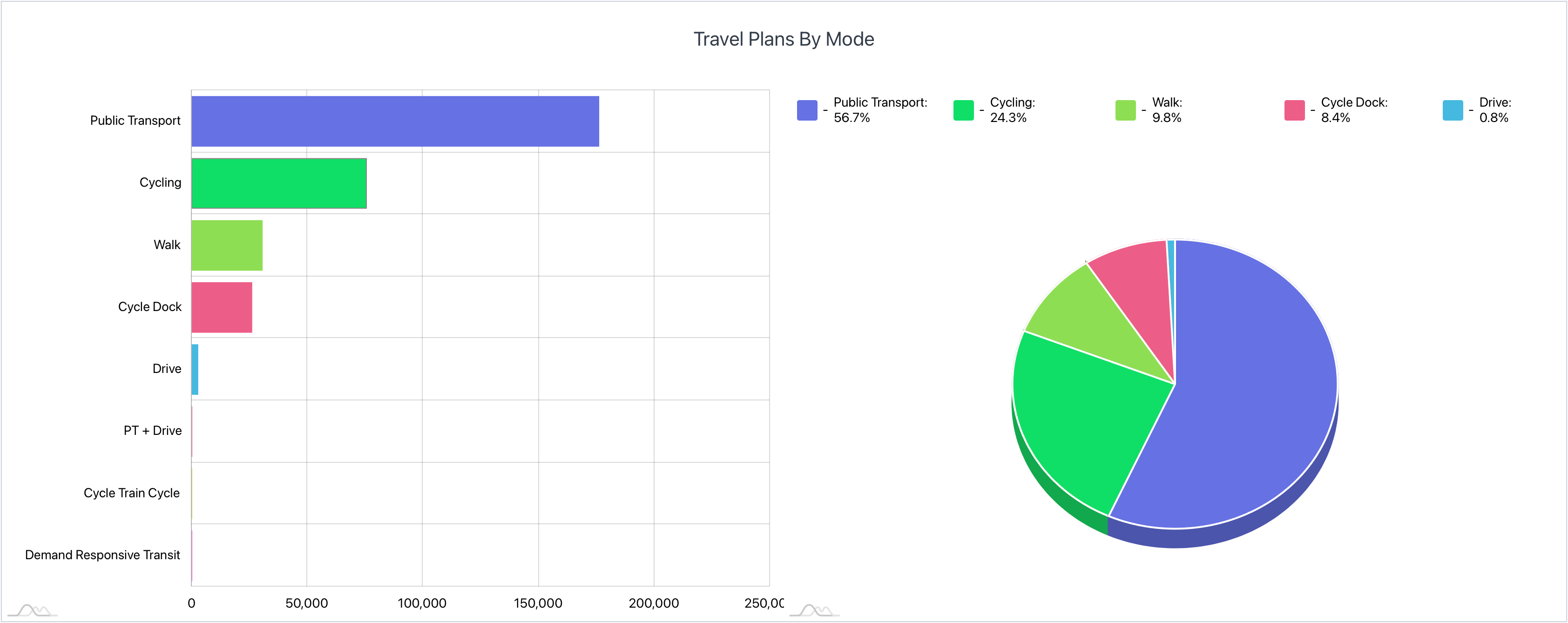How ‘You. Smart. Thing.’ is guiding Manchester to sustainability and beyond
‘You. Smart. Thing.’ has been selected to supply Transport for Greater Manchester with next generation multi-modal travel planning technology. Its aim is to support Mayor Andy Burnham’s vision for an integrated London-style transport system, that inspires regional regeneration by making it easier to get around by bus, tram, train, walking, wheeling, or cycling.
Manchester aspires to be the easiest place in the UK to live and work whilst becoming net zero. This means looking beyond sustainability, to a regenerative economy that the breathes life into society and the planet, much like the worker bee – Manchester’s enduring emblem and mascot for over 150 years.
Incorporating bespoke deployments for Manchester’s iconic football clubs, venues such as the newly opened Co-op Live arena, plus major events like Manchester Pride, the regional smart travel partnership ensures that the interests of visitors, venues, events and transport operators are fully aligned.
Transport is currently the largest contributor to the UK’s overall carbon footprint, at around 25%, with major events contributing a disproportionately to transit-based emissions, typically due to the average distance travelled. Combined with renewable energy sources, and reducing waste, cutting greenhouse gas emissions generated by transport has the potential to help rebalance climate change whilst having a transformative effect on regional economies.

Launched in September 2023 to coincide with Transport for Greater Manchester (“TfGM”) bringing the city-region’s buses under local control via franchising, the Bee Network journey planner was initially delivered as an embedded element of TfGM’s customer-facing website and transport strategy. It is seen as a key component of what TfGM managing director, Steve Warrener, describes as:
“A truly integrated, affordable, accessible and inclusive transport network that will provide excellent public transport and active travel choices for all; promoting sustainable travel behavioural change through integrated spatial, digital and transport planning; and supporting the electrification of vehicles and public transport fleets”.
In March 2024 the service also became available within the TfGM’s Bee Network mobile app – an additional retail channel for bus tickets across the network, with commuter rail integrated by 2030. As part of this programme of work several enhancements have already been made the feature rich ‘You. Smart. Thing.’ platform and travel assistant service, which is also used by venues and events across the UK to provide low-carbon travel plans to visitors. Bee Network updates include real-time bus times and fares, park and ride options, TfGM dock-to-dock cycle journey planning, and using cycling as a first and last mile option on journeys that include public transport.
Whilst the service includes driving options, travel behaviour from over 300,000 anonymous journey plans captured in the run up to Christmas 2023 showed usage heavily skewed towards people planning public transport journeys (~56%), with over 34% planning walking and cycling trips.

‘You. Smart. Thing.’ CEO, Chris Thompson explains:
“We are working to deliver the next generation of travel planning technology. Rather than simply looking for the shortest path YST’s eco-algorithm is designed to load-balance transport networks against socio-economic objectives that catalyse economic regeneration”.
In layman’s terms this means that whilst it provides quick routes across the city, the Bee Network journey planner recommends the lowest-carbon travel options first. For people travelling in and around Manchester this could mean avoiding congestion in favour of cleaner, greener, and ultimately more productive travel choices that improve access to economic opportunity. Commenting on this significant contract win for the UK-based green travel tech. platform, Thompson adds:
“YST’s experience of providing tailored, sustainable multi-modal travel planning solutions to local authorities, venues, and events is perfectly aligned with TfGM’s vision for the Bee Network across the Greater Manchester Combined Authority region. We look forward to helping TfGM continue to deliver a network which is simple to use, which supports seamless end-to-end journeys, and which delivers decarbonisation by helping people get real value from travelling as sustainably as possible.”
Editors Notes
The quote from Steve Warrener is taken from his Greater Manchester Transport Committee report of 09/12/22.
About ‘You. Smart. Thing.’
‘You. Smart. Thing.’ (YST) is the leading travel demand management platform for destinations, venues, and events. It is used to enhance visitor experience and engagement whilst reducing the disproportionate carbon footprint created by visitor travel.
The platform comprises an easily embedded web-based travel assistant interface for visitors, an intuitive travel assistant configuration dashboard, and a comprehensive data analytics and insights suite. The travel assistant interface utilises state-of-the-art web-based technology making it easy for destinations to implement. There’s nothing for visitors to download or install, it’s intuitive, mobile optimised, and integrated with client systems such as websites, mobile apps, ticket booking systems, and marketing communications.
YST has been used by Coventry City Council for UK City of Culture events, West Midlands Combined Authority for the Birmingham 2022 Commonwealth Games, and is now deployed by multiple regional authorities, destination management organisations, venues, and events, both in the UK and internationally, to help address their environmental, social, and governance (ESG) challenges, and to tackle decarbonisation.
For information about ‘You. Smart. Thing.’ please email hello@yousmartthing.com
About TfGM & The BEE Network
Transport for Greater Manchester (TfGM) is a local government body responsible for co-ordinating transport services throughout Greater Manchester in North West England. It is an executive arm of the Greater Manchester Combined Authority (GMCA), the city region’s administrative authority. The strategies and policies of Transport for Greater Manchester are set by the GMCA and its Greater Manchester Transport Committee (GMTC). The committee is made up of 33 councillors appointed from the ten Greater Manchester boroughs (Bolton, Bury, Manchester, Oldham, Rochdale, Salford, Stockport, Tameside, Trafford and Wigan), as well as the Mayor of Greater Manchester.
TfGM owns Metrolink – the United Kingdom’s largest light rail network – which is operated and maintained under contract by a Keolis/Amey consortium. TfGM also owns Greater Manchester’s Cycle Hire scheme, and is responsible for cycling and walking infrastructure. TfGM owns and maintains bus stations, stops & shelters, however bus services are deregulated in Great Britain outside London. Following the passing of the Bus Services Act 2017, Greater Manchester became the first city-region to start the process of bus franchising, returning bus services to public control. TfGM does not control National Rail services or infrastructure in Greater Manchester.
TfGM is responsible for developing the BEE Network, an integrated transport network for Greater Manchester. The BEE Network is proposed to include a single transport livery, integrated fares & ticketing, and a fare cap across tram, bus, cycling, walking, and eventually suburban rail. By 2025, Metrolink trams, franchised buses services, and cycle hire are planned to be integrated. Negotiations with central government are ongoing for some commuter rail services to join the network, starting from 2025.




